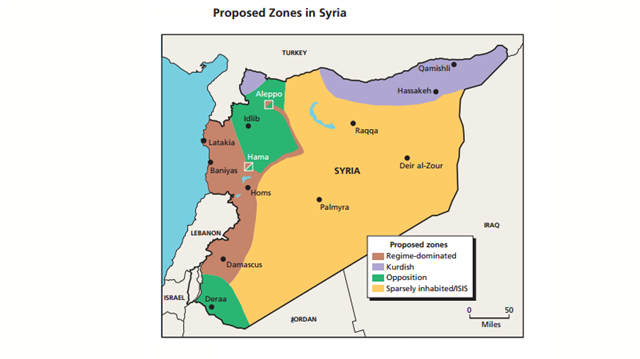
A Russian-American plan in Syria is likely to decentralize the country; Syria will be divided into three small states if ceasefire fails
The US policy in Syria has been changing in recent months, as Secretary of State John Kerry proposed to implement plan B if there is no outcome from a ceasefire that went into effect Friday at midnight.
The two main actors of the Syrian Civil War, Russia and the US, agreed on a two-week-long ceasefire in the country last week, planned to facilitate a political transition.
There was doubt about the ceasefire's stability, as neither Russia nor the Assad regime guaranteed they would not attack opposition groups. The moderate opposition also claimed that Russia and Syrian regime would strike at them, claiming they were Al Nusra or Daesh terrorists, as these two groups are not included in the truce.
Johan Kerry's latest statement on plan B was opposed by the Russians, but Washington seemed determined to push its plan to recognize the already divided regions of Syria.
According to the “De-escalation and Decentralization,” plan prepared by US President Obama's former advisor Philip Gordon, Syria will be divided into three parts that ultimately will form three new states.
Actually, it has already been divided into three parts. In Damascus, a Nusayri state, in Northern Syria, Kurdish administration and in the middle, the region said to belong to Sunni Arabs but currently under Daesh control.
In his report, Philip Gordon advised the US authority to hold a high-level secret meeting with Russia and said that a ceasefire or de-escalation of violence would be impossible without Moscow's approval.
Though the US would prefer not to allow Assad to remain in his position, it would be better than the current war, he said.
Russia also accepted the plan and will allow the pro-Kurdish YPG to gain ground to increase their territory for a probable Kurdish administration along the Turkish border.
Only areas held by the moderate opposition, who had said they were fighting for Syria, not a small territory or a state inside the country, would be part of Assad's state, according to the plan. It also envisions that Russia will launch air attacks on Daesh and al-Nusra, and Syrian ground forces will take territory from moderate groups.
A US think tank, the Rand Corporation, also suggested four zones in Syria in its “Peace Plan for Syria.”
Hello, the comments you share on our site are a valuable resource for other users. Please respect other users and different opinions. Do not use rude, offensive, derogatory, or discriminatory language.
The floor is all yours.








